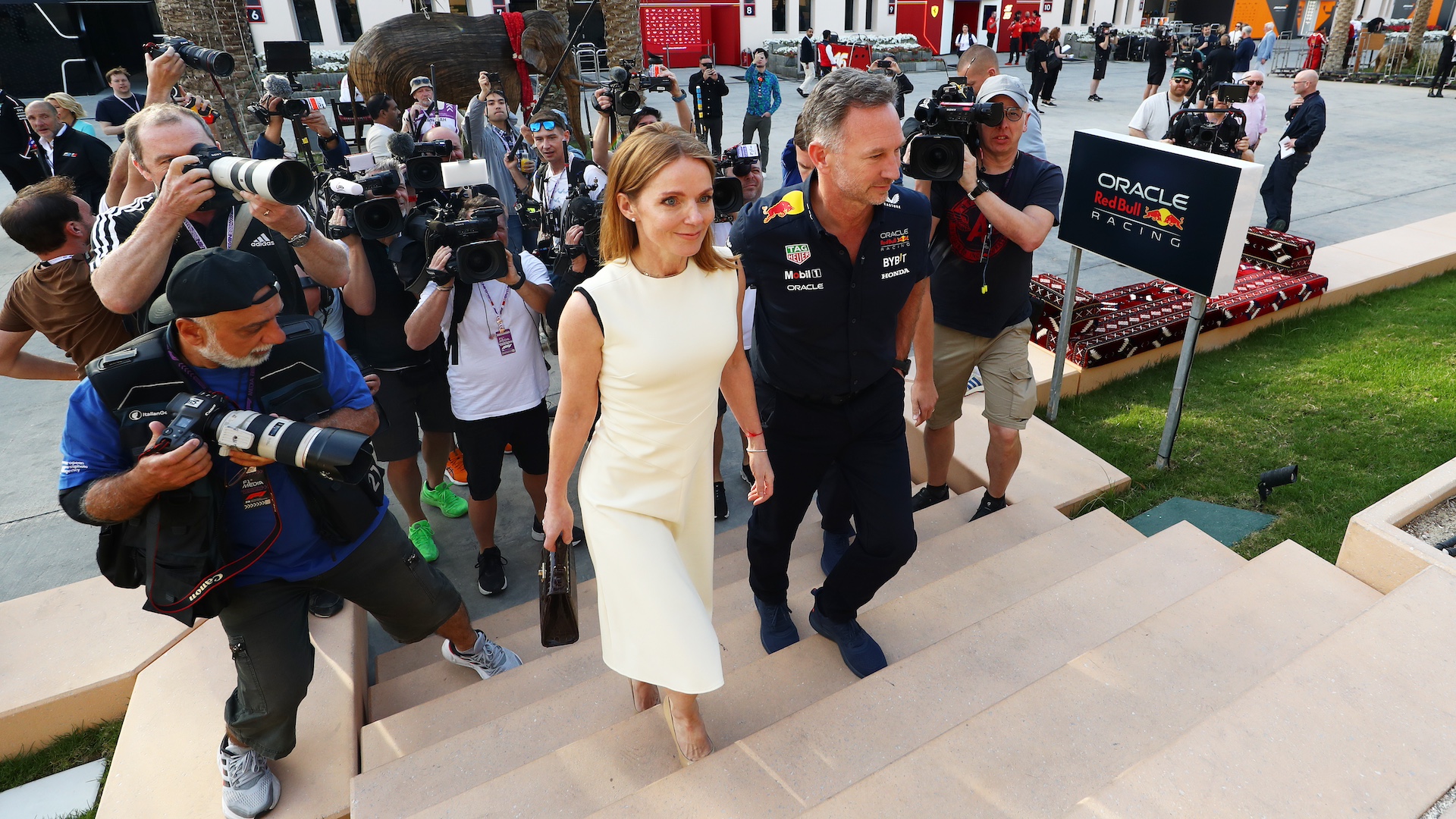

Red Bull Racing team boss Christian Horner effectively dominated Formula 1 headlines during the series’ opening round of the 2024 season, the Bahrain Grand Prix. His team may have finished 1-2, with driver Max Verstappen once again dominating the field—but it’s an ongoing scandal surrounding allegations that Horner allegedly acted inappropriately toward a colleague that has done the most damage. No matter how you feel about Horner or the incident in question, though, it should serve as an opportunity for the historically masculine world of F1 to challenge its long history of power imbalances—especially as it pertains to gender.
Let’s Establish The Facts
F1 is always prone to a bit of sensationalism and speculation, so before we actually talk about the roles of power in motorsport, it’s important to establish a verifiable path of action.
On Feb. 5, news organizations around the world reported that Christian Horner was officially under investigation following an accusation of “inappropriate” conduct toward a colleague. Four days later, on Feb. 9, Red Bull released another statement that clarified Horner was being investigated by an independent, external law firm; that same day, Horner was questioned by a lawyer involved in the investigation. On Feb. 15, Horner appeared at Red Bull’s car launch, and five days later, he flew to pre-season testing in Bahrain.

Then, on Feb. 28, we got a bombshell: Red Bull announced that the “independent investigation into the allegations against Mr. Horner is complete, and Red Bull can confirm that the grievance has been dismissed.” Horner was allowed to resume his role as Red Bull Racing team boss.
Motorsport publications jumped on the news and almost immediately reported that Horner was “cleared,” which was not necessarily the case. Lawyers choose their words wisely; if Horner had been absolved of wrongdoing, or found innocent altogether, then the lawyers would have made that clear. Rather, a dismissal of the investigation means only that it has come to an end; no verdict about innocence or guilt was given.
The following day, motorsport journalists received a Google Drive link from an anonymous email address that allegedly contained explicit images and screenshots of WhatsApp messages that had been involved in the investigation. So far, no one has been able to authenticate these messages, and it is not evidently clear that they are legitimate. The person who sent the email had access to a list of FIA hard-card-holding journalists and also included F1 CEO Stefano Domenicali and FIA president Mohammed Ben Sulayem in the email chain.
Horner appeared with his wife Geri Halliwell throughout the Bahrain Grand Prix weekend and celebrated Verstappen’s victory with the team.

Throughout the weekend, several people offered their perspectives on the Horner situation. Driver Max Verstappen was dispassionate when asked about the debacle; he refused to comment on any specific details of the allegations and instead simply stated that his relationship with Horner and the team atmosphere was “good.” His father, Jos, however, has taken a far stronger stance, demanding that Horner be fired, telling the Daily Mail, “There is tension here while he remains in position. The team is in danger of being torn apart. It can’t go on the way it is. It will explode. He is playing the victim, when he is the one causing the problems.”
(It’s worth noting that Jos Verstappen should not necessarily be praised for his stance; his relationship with Horner has always been tense, and it is certainly likely that he would utilize this opportunity to press for Horner’s departure. Jos Verstappen himself has utilized his power to hurt others, including when he was charged with assaulting his wife in December 2008, and when it was alleged that he attempted to hit an ex-girlfriend with his car.)
Other team principals weren’t quite as keen to let bygones be bygones, though; Zak Brown of McLaren and Toto Wolff of Mercedes have both expressed concerns about Red Bull’s outside investigation, asking the FIA to intervene.

“There is a lady in an organization that has spoken to HR and said there is an issue,” Wolff said during a team principals’ press conference Thursday. “It was investigated and yesterday the sport has received a message: ‘It’s all fine, we’ve looked at it.’ I believe that with the aspirations of a global sport, on such critical topics, it needs more transparency, and I wonder what the sport’s position is.”
The FIA, though, hasn’t looked to be an ally to Wolff and Brown on that front; FIA president Mohammed Ben Sulayem seemed to be concerned about the wrong issue when he mused to the Financial Times that the ongoing Horner saga was “damaging” to F1 and served to “overshadow” the beginning of a new season with “negativity.”
Now, the March 2024 issue of BusinessF1 Magazine promises that its cover story will be a 19-page report on the Red Bull drama, which will also include new allegations against Horner. However, it’s best to take everything BusinessF1 reports with a grain of salt; this is the publication that “reported” on seemingly false concerns that Susie Wolff, a member of the FIA, was sharing trade secrets with her husband, which resulted in an otherwise unfounded investigation.

It’s All About Power
The primary issue at play here is not about any specific actions or allegations against any one individual. Instead, that issue is power. No matter the findings of the investigation, a very powerful man in F1 acted in a way that made a subordinate woman uncomfortable enough to report his behavior and seek redress, and that is a power imbalance that F1 needs to address if it intends to continue its current growth.
In the world of motorsport, power has traditionally been held by straight, white, Western men. In the early days of racing, that meant women could be barred from competing against male drivers, or even banned entirely from a circuit’s garage area. Stirling Moss, one of the most promising British drivers of the 1950s and ’60s, was almost incapable of seeing women as anything other than “pieces of crumpet.” Former F1 boss Bernie Ecclestone felt women had no place in F1 and stated that they should be dressed in white “like all other domestic appliances.”

More recently came the scandal involving then-Haas driver Nikita Mazepin, who posted a video on his Instagram story in 2020 that seemed to show him groping a woman. Even though Haas called his actions “abhorrent,” Mazepin was allowed to continue with the team by posting an apology on Instagram… that he deleted nine days later. Previously, there was the backlash against F1’s 2018 decision to stop utilizing “grid girls” at the start of Grands Prix—a decision that I amply defended at the time, and that resulted in a prominent American race car driver encouraging his supporters to dox me.
Speaking personally, that isn’t the only negative experience I’ve had being a woman in the automotive industry. I’ve lost count of how many times someone has sneakily snapped my picture, and at one race I attended, a group of men surrounded me in a grandstand and refused to let me leave until I gave them my phone number. Experiences like that have blessedly become less common for me—but that may be because I’ve begun attending events in a professional capacity; even then, I run into issues that my male colleagues don’t experience. If I ask a driver a question, he will respond under the assumption that I’m unfamiliar with motorsport and will therefore offer a very boring, general answer that primarily explains a concept like qualifying. Other times, men have assumed that I’m a member of a public relations team, or a lifestyle influencer as opposed to a journalist. Women are becoming more prominent in paddocks around the world, but that doesn’t mean they’re welcomed as equals.

Those issues are, admittedly, quite minor when compared to what other women in motorsport have experienced, but they still serve as a barrier that prevents me from effectively doing my job. Other women have experienced far worse.
That discomfort stemming from imbalanced power roles lies at the heart of the ongoing Christian Horner scandal. Everything else aside, a woman who worked with Horner was made so uncomfortable by his behavior that she felt she had to report him; it is a step that no one takes lightly because it is almost certainly going to cost her her job. Even if a jury were to find Horner innocent, it would still not invalidate the complainant’s initial issue: that she felt someone else’s behavior toward her prevented her from doing her job.
Unfortunately, that essential fact has been lost in the ongoing media fallout. Instead, many powerful men in the sport are more concerned about the damage this will cause to F1’s reputation, or about an investigatory committee releasing findings that would benefit their specific cause. We are failing to interrogate F1’s historic power imbalances, and in doing so, we are failing to pave a more equitable way forward. If we don’t, F1’s growth will falter.
Got a tip? Email us at tips@thedrive.com